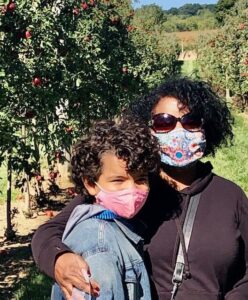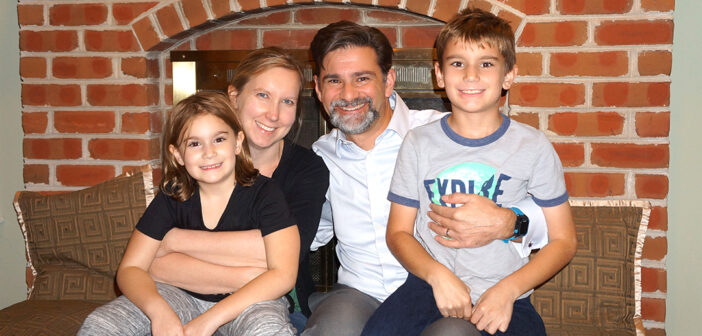This semester of college students are going to have some hefty competition if they are looking to be their professor’s favorite student.
Professors at Lehigh with young children in school now have the added task of not only teaching their college courses, but also helping their own kids with their coursework. In response to COVID-19, schools in the area have implemented varying elements of remote learning. Many of these students are young children who require guidance from their parents to supplement their learning.
On top of teaching Lehigh students in his accounting classes, Professor Joseph Manzo is also teaching his son and daughter at home to aid in their hybrid learning. While his Lehigh students are learning about financial statements and accounting, his kids are, too, and they are only in elementary school.
As he helps them learn math, he incorporates some things he normally teaches at Lehigh into his personal tutoring sessions with his children.
In the spring and over the summer, Manzo had established schedules with his children where they would have set times, and he would teach them. His wife, he said, took the bulk of the work in helping them stay on track with assignments.
Oftentimes, these new schedules result in a lack of sleep for Manzo and his wife.
“You have to find time to review what they’re doing, come up with some additional exercises for them, which you want to teach, so you just stay up later … and that’s a challenge because you are kind of always going off for maybe four or five hours sleep at night,” Manzo said.
Stephanie Watts, an associate professor of English, has a son in fifth grade who is doing fully remote learning.

Associate professor Stephanie Watts, right, and her son. Beyond teaching for Lehigh, Watts also helps her fifth grade son with his remote learning. (Courtesy of Stephanie Watts)
“It is just not the same, and so we have to step in and supplement for things,” Watts said. “Even with children who learn the material quickly, that’s still the case.”
Throughout the day, she stands in as both teacher and classmate, offering both help and discussion, while her son learns.
“In a sense, I’m homeschooling because everything that surrounds school — from recess to lunch to answering questions, you know those kinds of things of course — I’m doing,” she said.
Katherine Crassons, an associate professor of English, has two children who she had to teach full-time when classes first went online. Both kids have special needs and require significant modifications for their learning. They are now able to go to school in person full-time, but Crassons was considering taking family medical leave in the event they were not able to return to the classroom.
The school her kids attend offered remote or in-person options, and she chose the latter.
“They talk about kids from underprivileged backgrounds really bearing the brunt of the ill effects of pandemic, and my children have definite advantages as middle class white kids, but I think because they both have disabilities they fall into that into that category of kids who (are) really vulnerable to some of the perils of the remote learning,” Crassons said.
In school, her kids spend time in a special education classroom, and one of them receives one-on-one support throughout the day.
Crassons said the learning process was more difficult for her children, who do not work well independently.
“Unlike their neurotypical peers, they’re just not at a point where they can sit down with the iPad and a list of work and get it done,” Crassons said. “So I basically had to work with them one-on-one to get all their work done. I did one kid in the morning and one in the afternoon, and then I crammed my work in around afternoons and at night.”
Beyond in-person schooling, other support systems have been lost as well.
Crassons has lost her usual childcare. Their babysitter, who was a retired teacher in her 70s, can no longer come and help.
Crassons said the challenge has come from Lehigh as well, where expectations have seemed to intensify in certain aspects of teaching.
“I think, for the fall, there’s been a lot more pressure to produce quality online remote education if you’re doing that, which I understand,” she said. “(Students) are paying a lot of tuition dollars, and you need good classes and you want it to be as good of an experience as it can be. But I just also feel like, now that we’re back, there is still pressure to set and meet ambitious research goals, but there are practical realities making that incredibly difficult right now.”
Amidst the chaos and change, there are some silver linings.
Watts said it has been nice to get to know what is going on in her son’s class, and his quick school commute to the bedroom office is a time saver.
“I think just having that unique opportunity to be, in a more formal way, a teacher for them in addition to being a father, it’s been pretty cool,” Manzo said. “Just watching my daughter play softball and practicing with her in the yard and then teaching her financial statements, you know, back and forth, it’s been really great because my kids are really, really great.”






Comment policy
Comments posted to The Brown and White website are reviewed by a moderator before being approved. Incendiary speech or harassing language, including comments targeted at individuals, may be deemed unacceptable and not published. Spam and other soliciting will also be declined.
The Brown and White also reserves the right to not publish entirely anonymous comments.